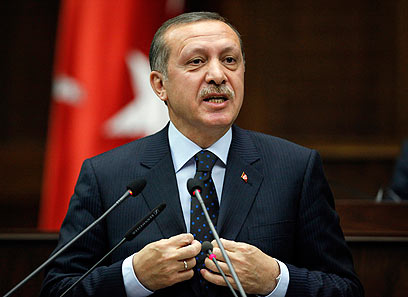
The growing rift between Israel and Turkey following the tragic results of the Gaza aid flotilla raid is beginning to take an immediate toll on the two countries' financial and commercial ties.
On Thursday, Ankara announced it was suspending all of its joint infrastructure projects with Israel, Turkish businessmen are cancelling meetings with Israeli counterparts and it seems tourist activity between the two countries has come to a screeching halt.
The shekel and the new Turkish Lira (TRY), it seems, have never been so estranged.
Significant commercial ties
According to the Manufacturers Association of Israel (MAI) and the Israel Export and International Cooperation Institute (IEI), some 900 large Israeli corporations are currently operating in Turkey, mainly in the chemistry, pharmaceutical and medical supplies, software and communication industries; and of course – various defense contractors.
Those include some of the biggest companies in Israel, such as Elbit Systems, Israel Chemicals, Israel Aerospace Industries (IAI), Netafim Crop and Israel Oil Refineries (ORL).
IMA and IEI data indicate that in 2009, some 1050 small exporters had commercial ties with Turkey and 557 had significant sales in the country.
Still, the Industry, Trade and Labor Ministry, IEI and MAI refused to divulge the names of all the Israeli companies trading with Turkey, citing business confidentiality. The decision may also stem from their desire to protect Israeli companies from a possible ban – or worse.
Israel's trade with Turkey came to $2.5 billion in 2009, with imports amounting to $1.4 billion and exports amounting to $1.1 billion.
Turkey was Israel's 10th largest market in 2009, with exports to it making up 1.6% of Israel's total exports, which came to $67.5 billion.
Turkey exported $109.7 billion worth of goods and services in 2009, with 2.2% of it to Israel.

Mutual interests will prevail? Anti-Israel rally in Turkey (Reuters)
Talks of boycott unrealistic'
"Talking about cutting all ties and a boycott are exaggerated and unrealistic," said Dan Catarivas, MAI's director of Foreign Trade and International Relations.
"We have to keep things in proportion. The vast economic ties between the two countries will persevere. The driving interests – on both sides – are stronger than any call against them."
Turkey's decision to suspend all joint ventures, he said, "was a government decision… which I'm not so sure can even come to pass, because it contradicts various international treaties Turkey is a part of, like the World Trade Organization, or the OECD – both of which prohibit such bans."
Catarivas said that even if Turkey declares an embargo, it would affect only the public sector in Israel, "which is only a small part of Israel's activity in Turkey."
Jerusalem and Ankara practice free market policies with an independent, robust business sector that is not subject to government directives, he added.
"And since the majority of the activity lies with the business sector, the financial forces will overcome any political pressure."
Catarivas believes that the "overall panic, as if Israeli and Turkey are on the verge of severing all ties," is mostly media-made.
"I know of no Turkish company that has severed ties with Israeli partners, nor do I know of any Israeli importer or exporter that has decided to do so."
Complexities of diplomatic relations
Catarivas said that there is no need to read too much into Ankara's decision to recall its ambassador.
"Diplomatic relations have many facets – political, economical, cultural – and they don't always coincide. Israel's political and strategic ties with Turkey are experiencing an obvious crisis; but in many cases, even if diplomatic ties are cut, commercial ties are preserved.
"Venezuela recalled its ambassador, Israel had no diplomatic relations with Austria for a year and Jordan and Egypt recall ambassadors on a regular basis, but it's always business as usual."

Entangled with the West. Turkish PM Erdogan (Photo: Reuters)
Turkey, he added, is facing a complex situation not only where Israel is concerned, but with the United States and Europe as well. "(Turkish Prime Minister Recep Tayyip) Erdogan's policies are hurting Turkey's ties with the West, but even within his powerbase – and a big part of that is Turkey's new business elite – many have business ties with Israel and their interests are to preserve ties.
"Here too, there are those who are furious with Turkey, but want to preserve business ties."
Checks and balances
As for concerns that Israeli defense contractors are supplying Ankara with weapons it may one day turn against Israel, Catarivas said he trusts that the defense establishment's system of checks and balances "would prevent Israeli exports from ending up in the wrong hands."
Catarivas went on to dismiss claims suggesting maintaining business ties with Turkey would be unpatriotic, maybe even self-serving: "It's in Israel's best interest to maintain business ties with as many markets as possible, Turkey included.
"Israel's existence relies on its continued market activity and exports. We employ thousands of people, which bolsters Israel just as much as national pride.
"In my opinion, conducting business – even with Turkey – is true patriotism."
Chairman Israel-Turkey Business Council Menashe Carmon agrees: "There is a strong interest to preserve commercial relations and they will persevere.
"What happened will, naturally, have a detrimental effect, but it's too early to say how much damage has been caused. I believe it will turn out to be less severe than we think."
He too believed the media contributed to a "sense of catastrophe, which isn’t true… At the end of the day, both parties want trade to continue – so it will."















